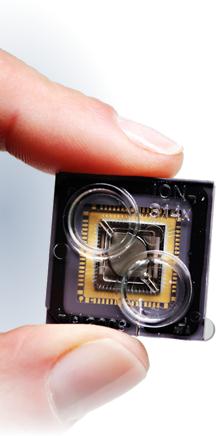Strategic collaboration promises leap forward in personalized medicine that could be game-changing for medical laboratories
One early effort to apply next generation gene sequencing to cancer diagnostics and therapeutics is a collaboration that involves Greenville Hospital System University Medical Center (GHS) in Greenville, South Carolina, and Lab21, Inc., a British company. GHS wants to use next gene sequencing as an integral part of the evaluation of every cancer patient cared for in the GHS system.
The partnership between GHS and Lab21 provides evidence for pathologists and clinical laboratories that first mover hospitals and health systems are now taking steps to incorporate next generation gene sequencing (NGS) into their cancer care protocols. Forward-looking pathology groups are already taking steps to expand their capabilities to perform and interpret genetic tests.
As collaborators, Lab21 and GHS have established a strategic relationship with Life Technologies Corporation to bring its Ion Torrent NGS technology into the clinical environment for personalized oncology medicine studies, a GHS news release stated. The semi-conductor technology will enable efficient translation of research into diagnostic applications.

Next generation gene sequencing will play a prominent role in cancer care at Greenville Hospital System University Medical Center (GHS) in Greenville, South Carolina. GHS is working with Lab 21, Inc. to perform next gen sequencing on cancer patients. The Collaboration will use the Ion Torrent System manufactured by Life Technologies. Pathologists will be involved and will help clinicians use the next generation sequencing data to diagnose cancer patients and make treatment decisions. (Photo by itor-ghs.org.)
“This breakthrough will allow us to advance the process of personalized oncology in a way that was not possible before in our community,” said W. Larry Gluck, M.D., Medical Director at the GHS Cancer Center.
Framework to Commercialize Biomarker Discoveries
It was March when Lab21 and GHS announced the launch of a new Clinical Genomics Center for next-generation sequencing. The center is physically located within GHS’ Institute for Translational Oncology Research (ITOR) campus. It is part of an ongoing collaboration between GHS and Lab21 to facilitate the introduction of complex biomarker analysis into routine cancer patient management, the company’s website stated.
Lab21, Inc. is the U.S. subsidiary of U.K.-based Lab21 Limited. Its 7,500 square-foot high-complexity CLIA laboratory provides molecular and genomic diagnostic testing services. The lab focuses on enabling personalized medicine for oncology and virology. Another area of focus is providing NGS services for clinical trials and translational research.
GHS is a 1,268-bed health system. The system includes medical campuses, a tertiary medical center, research and education facilities, community hospitals, physician practices, and numerous specialty facilities.
“This center… will pave the way for clinical trial applications and provide a framework to commercialize biomarker discoveries,” stated Michael Bolick, President of Lab21 in the GHS press release.
Collaboration is a key to commercializing biomarkers, according to Robert M. Goldberg, Ph.D., Co-founder and Vice President of the Center for Medicine in the Public Interest (CMPI). “[C]ollaboration can be used to accelerate the commercialization of personalized medicine biomarker-based innovation,” he wrote in a report titled “From Promise to Performance: Commercializing Personalized Medicine”.
Lab21 and GHS are leveraging their partnership to introduce state-of-the-art NGS technology for clinical trial applications with a view to introducing complex biomarker analysis into routine cancer patient management. Genome sequencing will enable GHS cancer patients to get real-time feedback and treatment plans specific to their cancer’s DNA signature, the GHS news release stated. It will also reduce the time between diagnosis and therapy to about a week, a story published at fiercehealth.com reported.
Faster, More Accurate, Cheaper Gene Sequencing Systems
GHS will be among the first sites in the country to use the game-changing Ion Torrent NGS system. This next generation sequencing system is based on semi-conductor technology. Life Technologies says that the system is capable of sequencing of the entire human genome in less than 24 hours for under $1,000.
This low cost is an important factor in the GHS/Lab 21 venture, because the collaborators believe they will be able to sequence entire human genomes for under $1,000 per individual by early next year. Currently available gene sequencing systems usually take several weeks and can cost from $5,000 to $10,000, the GHS news release stated.
In previous e-briefings, Dark Daily has predicted that swift advances in whole human genome sequencing could bring clinical applications to pathology on a much faster timeline than expected. (See Dark Daily, “New Semi-Conductor Technology Accelerates Whole-Genome Sequencing at Reduced Cost”.)
In that regard, Greenville Hospital System University Medical Center’s collaboration with Lab21 demonstrates how progressive hospitals and health systems will step up to incorporate new genetic testing technologies in ways that advance clinical care. This project will also put the pathologists at GHS on the front lines of interpreting data produced by next generation sequencing, then helping clinicians use this data to make both diagnostic and therapeutic decisions.
—Pamela Scherer McLeod
Related Information
Lab21 and ITOR unveil major leap forward in personalized cancer medicine
New Semiconductor Technology Accelerates Whole Genome Sequencing at Reduced Cost
From Promise to Performance: Commercializing Personalized Medicine (PDF)
THE DARK REPORT – Whole Genome Sequencing: Is It Ready for Prime Time?
What is THE DARK REPORT laboratory intelligence charter membership service?



